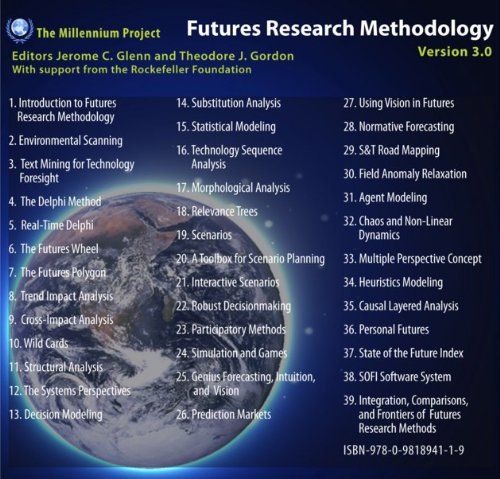

Futures Research Methodology Version 3.0
by Jerome C. Glenn; Theodore J. Gordon
About the book
Comprehensive and internationally peer-reviewed handbook on tools and methods for forecasting and analysis of global change. Each chapter in this series gives an executive overview of each method's history, description, primary and alternative usages, strengths and weaknesses, use in combination with other methods, and speculation about future usage. Some also contain appendixes with applications and sources for further information. All chapters are presented in an MsWord (.doc) Futures Research Methodology Version 3.0 is the largest, most comprehensive collection of internationally peer-reviewed handbook on methods and tools to explore future possibilities ever assembled in one resource in history. There are far more detailed book on specific methods, but no other resource comes close to giving the overview of such a range of methods. Each of these 39 chapters gives an executive overview of each method's history, description, primary and alternative usages, strengths and weaknesses, uses in combination with other methods, and speculation about future evolution of the method. Some also contain appendixes with applications, links to software, and sources for further information. Version 3.0 has not only added new chapters, it has also updated and improved the editing of the previous chapters making this version a significant improvement on the previous one. Over half of the chapters were written by the inventor of the method or by a significant contributor to the method s evolution: Table of Contents 1. Introduction to Futures Research Jerome C. Glenn 2. Environmental Scanning Theodore J. Gordon and Jerome C. Glenn 3. Text Mining for Technology Foresight Alan L. Porter 4. Delphi Theodore J. Gordon 5. Real-Time Delphi Theodore J. Gordon 6 The Futures Wheel Jerome C. Glenn 7. The Futures Polygon Antonio Pacinelli 8. Trend Impact Analysis Theodore J. Gordon 9. Cross-Impact Analysis Theodore J. Gordon 10. Wild Cards John Petersen and Karlheintz Steinmueller 11. Structural Analysis Jacques Arcade, Michel Godet, Francis Meunier, Fabrice Roubelat 12. The Systems Perspectives Allenna Leonard with Stafford Beer 13. Decision Modeling The Futures Group International 14. Substitution Analysis Theodore J. Gordon 15. 14. Statistical Modeling Antonio Pacinelli 16. Technology Sequence Analysis Theodore J. Gordon 17. Morphological Analysis Tom Ritchey 18. Relevance Trees The Futures Group International and Theodore J. Gordon 19. Scenarios Jerome C. Glenn and The Futures Group International 20. A Toolbox for Scenario Planning Michel Godet 21. Interactive Scenarios Theodore J. Gordon 22. Robust Decisionmaking Robert Lempert, Steven Popper, Steve Bankes (RAND Corporation) 23. Participatory Methods Jerome C. Glenn 24. Simulation and Games Erwin Rausch with additions from Frank Catanzaro 25. Genius Forecasting, Intuition, and Vision Jerome C. Glenn 26. Prediction Markets Justin Wolfers and Justin Zitzewitz 27. Using Vision in Futures Clem Bezold 28. Normative Forecasting Joe Coates and Jerome C. Glenn 29. S&&T Road Mapping Theodore J. Gordon 30. Field Anomaly Relaxation (FAR) Geoffrey R. Coyle 31. Agent Modeling (demo software) Theodore J. Gordon 32. Chaos and Non-Linear Dynamics Theodore Gordon 33. Multiple Perspective Concept Harold Linstone 34. Heuristics Modeling Sam Cole 35. Causal Layered Analysis Sohail Inayatullah 36. Personal Futures Verne Wheelwright 37.State of the Future Index Theodore J. Gordon 38. SOFI Software System Peter Yim 39. Integration, Comparisons, and Frontiers of Futures Research Methods Theodore J. Gordon and Jerome C. Glenn
We're searching 150 million books for sale
- Book Search
- Search by ISBN
- Textbook Search
- Search Signed Books
- Textbook Buyback
- Preferences
- Our Booksellers
- For the Press
- Media Mentions
- Sign in
- My Account
- Basket
Futures Research Methodology Version 3.0
By jerome c. glenn and theodore j. gordon.
- 2 Want to read
- 0 Currently reading
- 0 Have read
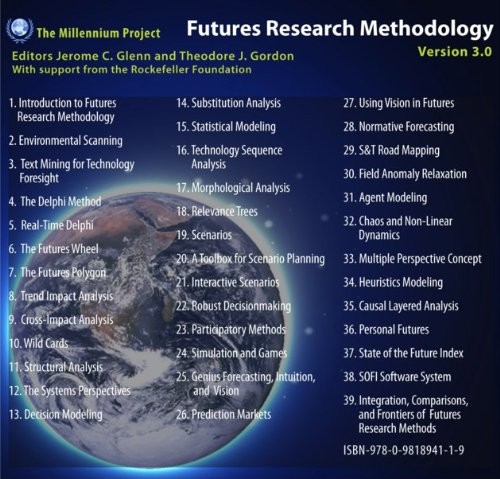
My Reading Lists:
Use this Work
Create a new list
My book notes.
My private notes about this edition:
Check nearby libraries
- Library.link
Buy this book
This edition doesn't have a description yet. Can you add one ?
Showing 1 featured edition. View all 1 editions?
| 1 |
Add another edition?
Book Details
The physical object, source records, community reviews (0).
- Created October 23, 2020
Wikipedia citation
Copy and paste this code into your Wikipedia page. Need help?
| Created by | Imported from |

Futures Research Methodology CD Version 3.0
Jerome Glenn, Ted Gordon from Millennium Project
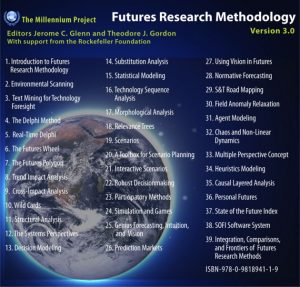
The Futures Research Methodology is the largest collection of futures tools and methods ever published. From simple tools to more complex methodologies, this resource features a wide-variety of foresight activities, many of which can be incorporated into classes at any level.
Join Jerome and 9.2+ million other Small Business Owners
Futures Research Methodology 3.0
Futures Research Methodology Version 3.0 is the largest, most comprehensive collection of internationally peer-reviewed handbook on methods and tools to explore future possibilities ever assembled in one resource.
Over half of the chapters were written by the inventor of the method or by a significant contributor to the method’s evolution.
FRM 3.0 contains 39 chapters totaling about 1,300 pages. Each method is treated in a separate file in word (.doc) and PDF format.
http://millennium-project.org/millennium/FRM-V3...
We Also Offer
Best Sellers
- Most Popular
- Science & Math
Futures Research Methodology Version 3.0
- Description
Click on this books subject categories to see related titles:
Science & Math > Research
Science & Math > Experiments, Instruments & Measurement
Science & Mathematics
Comprehensive and internationally peer-reviewed handbook on tools and methods for forecasting and analysis of global change. Each chapter in this series gives an executive overview of each method's history, description, primary and alternative usages, strengths and weaknesses, use in combination with other methods, and speculation about future usage. Some also contain appendixes with applications and sources for further information. All chapters are presented in an MsWord (.doc) Futures Research Methodology Version 3.0 is the largest, most comprehensive collection of internationally peer-reviewed handbook on methods and tools to explore future possibilities ever assembled in one resource in history. There are far more detailed book on specific methods, but no other resource comes close to giving the overview of such a range of methods. Each of these 39 chapters gives an executive overview of each method's history, description, primary and alternative usages, strengths and weaknesses, uses in combination with other methods, and speculation about future evolution of the method. Some also contain appendixes with applications, links to software, and sources for further information. Version 3.0 has not only added new chapters, it has also updated and improved the editing of the previous chapters making this version a significant improvement on the previous one. Over half of the chapters were written by the inventor of the method or by a significant contributor to the method s evolution: Table of Contents 1. Introduction to Futures Research Jerome C. Glenn 2. Environmental Scanning Theodore J. Gordon and Jerome C. Glenn 3. Text Mining for Technology Foresight Alan L. Porter 4. Delphi Theodore J. Gordon 5. Real-Time Delphi Theodore J. Gordon 6 The Futures Wheel Jerome C. Glenn 7. The Futures Polygon Antonio Pacinelli 8. Trend Impact Analysis Theodore J. Gordon 9. Cross-Impact Analysis Theodore J. Gordon 10. Wild Cards John Petersen and Karlheintz Steinmueller 11. Structural Analysis Jacques Arcade, Michel Godet, Francis Meunier, Fabrice Roubelat 12. The Systems Perspectives Allenna Leonard with Stafford Beer 13. Decision Modeling The Futures Group International 14. Substitution Analysis Theodore J. Gordon 15. 14. Statistical Modeling Antonio Pacinelli 16. Technology Sequence Analysis Theodore J. Gordon 17. Morphological Analysis Tom Ritchey 18. Relevance Trees The Futures Group International and Theodore J. Gordon 19. Scenarios Jerome C. Glenn and The Futures Group International 20. A Toolbox for Scenario Planning Michel Godet 21. Interactive Scenarios Theodore J. Gordon 22. Robust Decisionmaking Robert Lempert, Steven Popper, Steve Bankes (RAND Corporation) 23. Participatory Methods Jerome C. Glenn 24. Simulation and Games Erwin Rausch with additions from Frank Catanzaro 25. Genius Forecasting, Intuition, and Vision Jerome C. Glenn 26. Prediction Markets Justin Wolfers and Justin Zitzewitz 27. Using Vision in Futures Clem Bezold 28. Normative Forecasting Joe Coates and Jerome C. Glenn 29. S&&T Road Mapping Theodore J. Gordon 30. Field Anomaly Relaxation (FAR) Geoffrey R. Coyle 31. Agent Modeling (demo software) Theodore J. Gordon 32. Chaos and Non-Linear Dynamics Theodore Gordon 33. Multiple Perspective Concept Harold Linstone 34. Heuristics Modeling Sam Cole 35. Causal Layered Analysis Sohail Inayatullah 36. Personal Futures Verne Wheelwright 37.State of the Future Index Theodore J. Gordon 38. SOFI Software System Peter Yim 39. Integration, Comparisons, and Frontiers of Futures Research Methods Theodore J. Gordon and Jerome C. Glenn
Customer Book Reviews
great book to read
By Sizi Kawalawu on Feb 17, 2015
Yes, great book to read
I recommend it
By Maria Auxiliadora Lopez on Jul 09, 2015
The content is excellent, Maybe will be important to do a Kindle version, because is more accessible.
5.0 out of 5 stars
By Ahmed Saleh on Jun 12, 2019
The content of the report is comprehensive and covers a wide range of methods and techniques.
1.0 out of 5 stars
4.0 out of 5 stars
Add a Book Review
Book Summary:
Academia.edu no longer supports Internet Explorer.
To browse Academia.edu and the wider internet faster and more securely, please take a few seconds to upgrade your browser .
Enter the email address you signed up with and we'll email you a reset link.
- We're Hiring!
- Help Center

Evaluation and Organization of Futures Research METHODOLOGY—V3. 0

millennium-project.org
Related Papers
Martijn van der Steen
Technology Analysis & Strategic Management
Erik Den Hartigh
journal of Futures Studies
Andrew Curry
This paper describes a futures method called the "Three Horizons" which enables different futures and strategic methods to be integrated as and when appropriate. The method is still in development. It differs significantly from the original version described in the management literature a decade ago. The approach has several strengths. It can relate drivers and trends-based futures analysis to emerging issues. It enables policy or strategy implications of futures to be identified. And it links futures work to processes of change. The paper connects this latter aspect to models of change developed within the 'social shaping' school of technology. Finally, it summarises a number of futures applications where this evolving technique has been used.
Patrick Van Der Duin
If there is one activity that needs to stay up to date on change and innovation, it is futures research. I argue that futures research can be innovated first of all by exploring the scientific nature of futures research, and then by approaching the variety of methods used in futures research in a contingent way and, finally, by making futures researchers more aware of the organizational context of the use of their work.
Mohamed Saleh
Abstract Futures studies, or long-range perspective studies, are an indispensable source of help for sound planning and decision making in today's chaotic, complex and rapidly changing world. The accelerating pace of change, together with a multitude of accompanying uncertainties, make it all the more important to expand our time perspectives so as to include the future, ie. to futurize our thinking. This can generally be done through utilizing a variety of futures studies methods.
Ihab El-Khodary , ahmedomran ahmedomran
Ben Ramalingam
European Journal of Futures Research
Kerstin Cuhls
Loading Preview
Sorry, preview is currently unavailable. You can download the paper by clicking the button above.
RELATED PAPERS
Nursing Outlook
Daniel Pesut
Anthony Hodgson, Ph.D.
Marika Puglisi
Alireza Hejazi, Ph.D.
Rafael González , Kalle A. Piirainen
Social Technologies, Washington
Andréa Freire
SSRN Electronic Journal
Britta Oertel
Academy of Management Insights
Alex Fergnani
Haakon Faste
Futures research quarterly
Wendell Bell
erzsebet novaky
Eddie Blass
Service Innovation and Design - Stories of the Emerging Themes and Impact of the Education
Anu Nousiainen
Richard Slaughter
Nicholas J Rowland , Matthew J . Spaniol
Barbara Adam
OCAD U - Master Research Project
Maggie Greyson
Knowing tomorrow?: how science deals with the future
Sohail Inayatullah
RELATED TOPICS
- We're Hiring!
- Help Center
- Find new research papers in:
- Health Sciences
- Earth Sciences
- Cognitive Science
- Mathematics
- Computer Science
- Academia ©2024
- Science and Nature
Sorry, there was a problem.
Image unavailable.

- To view this video download Flash Player

Futures Research Methodology: The Millennium Project: Version 3.0 CD-ROM – 30 April 2009
- ISBN-10 0981894119
- ISBN-13 978-0981894119
- Edition 3.0
- Publication date 30 April 2009
- Language English
- Print length 1300 pages
- See all details
Customer reviews
- 5 star 4 star 3 star 2 star 1 star 5 star 68% 0% 0% 0% 32% 68%
- 5 star 4 star 3 star 2 star 1 star 4 star 68% 0% 0% 0% 32% 0%
- 5 star 4 star 3 star 2 star 1 star 3 star 68% 0% 0% 0% 32% 0%
- 5 star 4 star 3 star 2 star 1 star 2 star 68% 0% 0% 0% 32% 0%
- 5 star 4 star 3 star 2 star 1 star 1 star 68% 0% 0% 0% 32% 32%
Review this product
- Sort reviews by Top reviews Most recent Top reviews
Top reviews from Singapore
Top reviews from other countries.
- Press Releases
- Amazon Science
- Protect and Build Your Brand
- Advertise Your Products
- Sell on Amazon
- Associates Programme
- Fulfillment by Amazon
- COVID-19 and Amazon
- Your Account
- Your Orders
- Shipping Rates and Policies
- Recalls and Product Safety Alerts
- Conditions of Use
- Privacy Notice
- Interest-Based Ads
The Millennium Project and beyond
ISSN : 1463-6689
Article publication date: 16 September 2013
Cordeiro, J.L. (2013), "The Millennium Project and beyond", Foresight , Vol. 15 No. 5. https://doi.org/10.1108/FS-03-2013-0008
Emerald Group Publishing Limited
Article Type: Guest editorial From: foresight, Volume 15, Issue 5
The Millennium Project was founded in 1996 after a three-year feasibility study with the United Nations University, Smithsonian Institution, Futures Group International, and the American Council for the United Nations University (UNU). It is now an independent non-profit global participatory futures research think tank of futurists, scholars, business planners, and policy makers who work for international organizations, governments, corporations, NGOs, and universities. The Millennium Project currently manages a coherent and cumulative process that collects and assesses judgments from over 4,000 experts from close to 100 countries that have contributed with their views to The Millennium Project since its inception.
The State of the Future (SOF) (Glenn et al. , 2012) has been analyzing the 15 Global Challenges, year after year, besides other special studies and the State of the Future Index (SOFI), which monitors the variables that are getting better and the ones that are getting worse. The SOF print edition is just an executive summary with over 10,000 additional pages of accumulated research over the years.
The Futures Research Methodology (FRM) (Glenn and Gordon, 2012) is now on its third edition and it includes 39 chapters with over 1,300 pages describing the most important methodologies on futures research. The FRM version 3.0 was sponsored by the Rockefeller Foundation and it is the largest internationally peer-reviewed collection of methods to explore the future ever assembled in one source.
The Global Futures Intelligence System (GFIS) (The Millennium Project, 2013) is a new collective intelligence system that integrates all of the information, groups, and software of The Millennium Project in a single location. The GFIS is novel way to participate with and have access to a general overview of major global issues that can be read and understood in just 15 minutes, including historical data and future forecasts.
The Millennium Project is not a one-time study of the future, but provides an on-going capacity as a geographically and institutionally dispersed think tank. It was selected among the Best 7 Foresight Organizations by US Office of Energy, and it was a 2012 Computerworld laureate for its innovations in collective intelligence systems. Most annual State of the Future reports have been selected by the publication Future Survey as among the years best books on the future, the international journal Technological Forecasting & Social Change has dedicated several entire issues to the annual State of the Future ., and foresight reviewed the 2012 State of the Future as “strategic planning for the planet.
Heiko A. von der Gracht and Inga-Lena Darkow (Institute for Futures Studies and Knowledge Management [IFK], EBS Business School, Wiesbaden, Germany, and members of the German Node of The Millennium Project) analyzed “The future role of logistics for global wealth: Scenarios and discontinuities until 2025. Von der Gracht and Darkow researched global logistics scenarios with focus on the future contribution the logistics industry can make to the triple bottom line – people, planet and profit. Over 200 experts were asked to share their visions via a real-time Delphi (RTD) study. The results were further examined in futures workshops according to World Café methodology to developed 20 key Delphi projections for global logistics in 2025.
Aharon Hauptman and Yair Sharan (Interdisciplinary Center for Technology Analysis and Forecasting [ICTAF],Tel-Aviv University, Israel, and members of the Israeli Node of The Millennium Project) analyzed “Foresight of evolving security threats posed by emerging technologies. Hauptman and Sharan consider the overlooked “dark side of new technologies, and their potential abuse by terrorists or organized crime. The EU-funded project FESTOS assesses security issues following a horizon scanning and a Delphi expert survey to rank the “abuse potential and “threat intensity of 33 emerging technologies. “Weak signals, “wild cards and a variant of the “futures wheel method were used to construct four “scenario sketches considering potential future threats.
William E. Halal (George Washington University, Washington DC, USA, Bangkok University, Thailand, and participant of the Cyber Node of The Millennium Project) wrote “Through the megacrisis: making the passage to global maturity. Halal used an online survey to assess attitudes toward four scenarios defining the range of possible outcomes of the “global megacrisis, with an improved Delphi method to estimate when emerging technologies are likely to enter mainstream use. An evolutionary perspective and “collective intelligence methods helped to understand how the world could make the passage through todays “global megacrisis to a more sophisticated level of development by about 2020.
Tony Diggle (independent consultant, London, England, and member of the UK Node of The Millennium Project) worked on “Water: how collective intelligence initiatives can address this global challenge. Diggle analyzes online collective intelligence systems that make it easier to set practical goals and monitor progress to send, receive and act on the latest research and new information. Recent developments by the World Water Assessment Panel (WWAP) of UNESCO, the International Water Association (IWA), and the IWA WaterWiki are considered, and then potential future developments are examined from a collective intelligence viewpoint dealing with water challenges.
Sven Hirsch, Paul Burggraf and Cornelia Daheim (Zpunkt the foresight company, Köln, Germany, and members of the German Node of The Millennium Project) consider “Scenario planning with integrated quantification – managing uncertainty in corporate strategy building. Hirsch, Burggraf and Daheim present a practical methodology for establishing quantitative scenarios in a participative process within a business environment. Their method follows the classical scenario design process of key factor analysis, projection design, interaction analysis, and scenario selection. Each step helps to consolidate the qualitative and quantitative description of the strategic scenarios.
Pavel Nováek (Palacky University, Olomouc, Czech Republic, Czech Association of the Club of Rome, Prague, Czech Republic, and member of the Central European Node of The Millennium Project) considered “Thinking oriented towards the future: key to prosperity and sustainable development? Nováek proposes a new methodology called the Future Oriented Thinking Index (FOTI) using 23 indicators. The FOTI is an approach close to the State of the Future Index (SOFI) developed by Theodore J. Gordon and the Millennium Project, but the FOTI should focus more on identifying how people are able to take into account future challenges and behave according to them, and less on the “state of the future (measuring whether the indicators will improve or deteriorate).
Futurists often explain that the purpose of thinking about the future is not to predict what will happen, but rather to visualize possibilities and consider plausible alternatives. These papers are an important starting point to consider some of those possibilities and alternatives. Although we cannot know or determine the future, our aim with this Special Issue is to promote dialogue, facilitate creative thinking, and provide an additional platform for voices from The Millennium Project. We hope this special issue “The Millennium Project and Beyond contributes to this important dialogue to create better futures for humanity.
Acknowledgements
The Guest Editor wants to thank personally three senior staff of The Millennium Project: Executive Director Jerome C. Glenn for his leadership, Senior Research Fellow Theodore J. Gordon for his wisdom, and Research Director Elizabeth Florescu for her diligence.
José Luis Cordeiro Director, Millennium Project, Venezuela Node, Caracas, Venezuela
Glenn, J.C. and Gordon, T.J. (2012), Futures Research Methodologies, Version 3.0 , The Millennium Project, Washington, DC, available at: http://http://millennium-project.org/millennium/FRM-V3.html Glenn, J.C., Gordon, T.J. and Florescu, E. (2012), 2012 State of the Future , The Millennium Project, Washington, DC, available at: http://millennium-project.org/millennium/2012SOF.html The Millennium Project (2013), Global Futures Intelligence System (GFIS) , The Millennium Project, Washington, DC, available at: https://themp.org
Related articles
All feedback is valuable.
Please share your general feedback
Report an issue or find answers to frequently asked questions
Contact Customer Support
Cookies and advertising choices
If you agree, we may use your personal information from any of these Amazon services to personalize the ads we show you on other services. For example, we may use your Prime Video Watch history to personalize the ads we show you on our Stores or on Fire TV. We may also use personal information we receive from third parties (like demographic information).
In addition, if you agree, we’ll also use cookies to complement your shopping experience across the Amazon stores as described in our Cookie notice . Your choice applies to using first-party and third-party advertising cookies on this service. Cookies store or access standard device information such as a unique identifier. The 96 third parties who use cookies on this service do so for their purposes of displaying and measuring personalised ads, generating audience insights, and developing and improving products.
In any case, we use cookies and similar tools that are necessary to enable you to make purchases, to enhance your shopping experiences and to provide our services, as detailed in our Cookie notice . We also use these cookies to understand how customers use our services (for example, by measuring site visits) so we can make improvements. Click “Decline” to reject, or “Customise” to make more detailed advertising choices, or learn more. You can change your choices at any time by visiting Cookies and advertising choices . To learn more about how and for what purposes Amazon uses personal information (such as Store order history or Prime Video Watch history) and cookies, please visit our Privacy notice and our Cookie notice .
- Science, Nature & Maths
- Miscellaneous
Sorry, there was a problem.

Download the free Kindle app and start reading Kindle books instantly on your smartphone, tablet or computer – no Kindle device required .
Read instantly on your browser with Kindle for Web.
Using your mobile phone camera - scan the code below and download the Kindle app.

Image Unavailable

- To view this video download Flash Player

Follow the author

Futures Research Methodology: The Millennium Project: Version 3.0 CD-ROM – 30 April 2009
- ISBN-10 0981894119
- ISBN-13 978-0981894119
- Edition 3.0
- Publisher Milennium Project
- Publication date 30 April 2009
- Language English
- Dimensions 13.97 x 0.64 x 13.34 cm
- See all details
Product details
- Publisher : Milennium Project; 3.0 edition (30 April 2009)
- Language : English
- ISBN-10 : 0981894119
- ISBN-13 : 978-0981894119
- Dimensions : 13.97 x 0.64 x 13.34 cm
About the author
Theodore j. gordon.
Discover more of the author’s books, see similar authors, read author blogs and more
Customer reviews
- 5 star 4 star 3 star 2 star 1 star 5 star 68% 0% 0% 0% 32% 68%
- 5 star 4 star 3 star 2 star 1 star 4 star 68% 0% 0% 0% 32% 0%
- 5 star 4 star 3 star 2 star 1 star 3 star 68% 0% 0% 0% 32% 0%
- 5 star 4 star 3 star 2 star 1 star 2 star 68% 0% 0% 0% 32% 0%
- 5 star 4 star 3 star 2 star 1 star 1 star 68% 0% 0% 0% 32% 32%
Customer Reviews, including Product Star Ratings, help customers to learn more about the product and decide whether it is the right product for them.
To calculate the overall star rating and percentage breakdown by star, we don’t use a simple average. Instead, our system considers things like how recent a review is and if the reviewer bought the item on Amazon. It also analyses reviews to verify trustworthiness.
- Sort reviews by Top reviews Most recent Top reviews
Top reviews from Germany
Top reviews from other countries.
- Press Releases
- Amazon Logistikblog
- Amazon Science
- Sell on Amazon
- Sell on Amazon Business
- Sell on Amazon Handmade
- Associates Programme
- Fulfilment by Amazon
- Seller Fulfilled Prime
- Advertise Your Products
- Independently Publish with Us
- Host an Amazon Hub
- › See More Make Money with Us
- Amazon Visa
- Shop with points
- Credit Card
- Monthly Invoice
- SEPA Direct Debit
- Amazon Currency Converter
- Top Up Your Account
- Top Up Your Account in Store
- COVID-19 and Amazon
- Track Packages or View Orders
- Delivery Rates & Policies
- Returns & Replacements
- Recycling (including disposal of electrical and electronic equipment)
- Manage Your Content and Devices
- Amazon Mobile App
- Customer Service
- Cancel Vodafone contracts
- Accessibility
- Report illegal content
- Conditions of Use & Sale
- Privacy Notice
- Cookies Notice
- Interest-Based Ads Notice
- Privacy Statement
- Planning Committee
- GC1 Sustainable Development and Climate Change
- GC2 Clean Water
- GC3 Population and Resource
- GC4 Democratization
- GC5 Global Foresight and Decision-making
- GC6 Global Convergence of IT
- GC7 Rich-Poor Gap
- GC8 Health Issues
- GC9 Education and Learning
- GC10 Peace and Conflict
- GC11 Status of Women
- GC12 Transnational Organized Crime
- GC13 Energy
- GC14 Science and Technology
- GC15 Global Ethics
- Various Studies
- Global Futures Intelligence System
- Future Work/Technology 2050
- State of the Future Index
- Real-Time Delphi
- Workshops & Training
- Presentations & Speeches
- Publications
- Internships
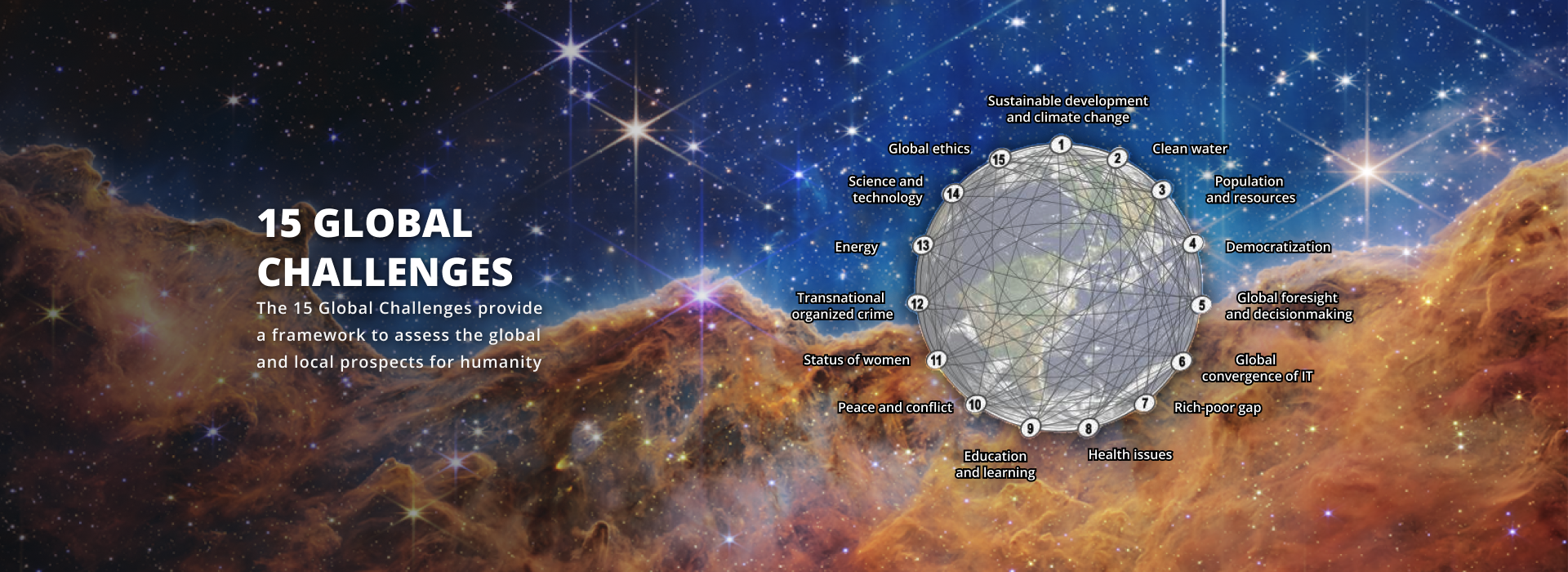
Quick Menu (click title text not the icon)
15 global challenges, artificial general intelligence, work/tech 2050: scenarios and actions, state of the future, futures research methodology 3.0, about the millennium project.

The Millennium Project is a global participatory think tank established in 1996 under the American Council for the United Nations University that became independent in 2009 and has grown to 72 Nodes around the world .
It connects futurists around the world and collaborates to improve global foresight .
Improve humanity’s prospects for building a better future.
Improve thinking about the future and make that thinking available through a variety of media for feedback to accumulate wisdom about the future for better decisions today.
A global foresight network of Nodes, information, and software, building a global collective intelligence system recognized for its ability to improve prospects for humanity. A think tank on behalf of humanity, not on behalf of a government, or an issue, or an ideology, but on behalf of building a better future for all of us.
About The Millennium Project Nodes
A Millennium Project Node is a self-organizing group of institutions and individuals recognized by the Project that will facilitate the Project’s research or conduct autonomous research in support of the Project. In this capacity, each Node will participate in the identification of incipient world issues and opportunities, study their prospect and their potential resolution, as well as methods for accomplishing such research.

Each Millennium Project Node:
- Assumes lead responsibility for a geographic area or subject
- Has access to the entire Millennium Project (staff, information system, international panels, and the other Nodes) in carrying out its specialized responsibility
- Selects its own Chair who is responsible for the work of the Node and communications with the Project’s coordinating office
See 14 ways you can get involved!
The millennium project - latest.
Check out our latest activities and news!
Current Activities
- International assessment of future governance models for the transition from Artificial Narrow to Artificial General Intelligence .
- Working on the next State of the Future report, current version: State of the Future 19.1 (print and download)
- Working with the Executive Office of the UN Secretary-General, The Millennium Project conducted a Real-Time Delphi to assess the five foresight elements of the UNSG’s report Our Common Agenda . The RTDelphi panel of 189 professionals from 54 countries provided 1,463 answers of which 983 were explanations and comments. About half the panel had 20 or more years of professional foresight or related experience. Download the report (pdf)
- 2030 State of the Future Index re-assessed the 29 global variables and generated the new World Report Card on the future.
- Up-dating FUTURES dictionary/encyclopedia of futurist terms and methods; current version
- Futures Dictionary/Encyclopedia ( English and Spanish )
- Global Scanning for the 15 Global Challenges (while the Global Futures Intelligence System GFIS is being re-positioned in Amazon, new scanning items can be added here.
- Future Work/Technology 2050: Scenarios and Actions. The report covers the three-year study on the future dynamics of work and technology with three detailed global scenarios, results of 30 national workshops in 29 countries, and five Real-time Delphi’s that rated 93 actions distilled from those suggested to address issues raised in the three scenarios by the national workshops. Each of the 93 actions have ratings and comments from several hundred futurists and related experts. This is probably the broadest international assessment of long-range actions to address the future of work thus far. Workshops Future Work/Technology 2050 and 7.5 minute video overview
- Short Videos of each of the 15 Global Challenges are now available and other MP Videos .
- Philosophy, History, and STS (Science, Technology, Society) scholars’ views on Futures Research and Foresight conference (Grappling with the Futures) at Harvard and Boston Universities – abstracts available .
Recent News
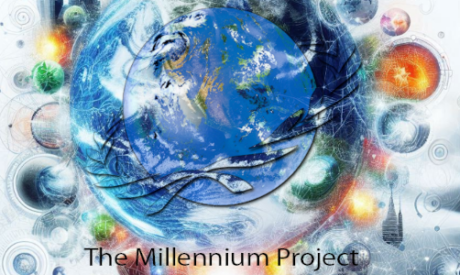
The Millennium Project Newsletter – July & August, 2024
- Posted by Mara Di Berardo
- On 31 July 2024
A new issue of our newsletter is out, packed with previews and major events! We’ve entered Phase 3 of our research on...
- AGI governance, communication, news, newsletter, State of the Future, UN Summit of the Future

RIBER Meeting in Monterrey – September 24-25, 2024
- On 30 July 2024
RIBER, Red Iberoamericana de Prospectiva and Regional Network of The Millennium Project, invites all members to join its next in person meeting...
- meeting, Monterrey, RIBER
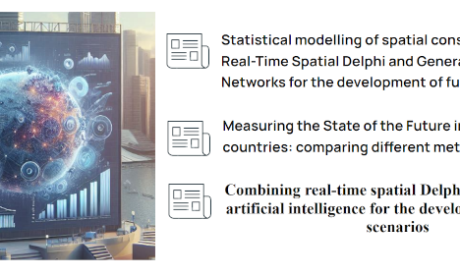
Innovative approaches for scenarios and statistical analyses
Simone Di Zio, Co-Chair of Italy Node of The Millennium Project, in collaboration with other colleagues, recently published conference proceedings that explore...
- artificial intelligence, delphi, European Union, Generative Adversarial Networks, proceedings, publications, Real-Time Spatial DElphi, Scenarios, State of the Future, statistical modelling
FEATURED VIDEOS
A pragmatic exploration of possible futures - choices and consequences - really exercised my imagination.
Vint Cerf, Internet pioneer,
Strategic planning for the planet; must reading for world leaders.
William Halal,
One of the best studies of modern terrorism and what to do about it.
Jamie Shea,
A high level, reliable intellectual compass for the conflict ridden, and uncertain world advancing toward the mid-century.
Mihály Simai,
Outstanding report!
Jim Spohrer,
An important example of using scientific methods and collective intelligence to help us understand and act better for the future.
Phil Mjwara,
Certainly, the guide to make better decisions and achieve success.
Julio Millán,
Authoritative compendium of what we know about the future of humanity and our planet.
The Futurist,
Strategic Planning for the Planet… remarkably articulate and prescient
Willian Halal,
Absolutely worth the reader’s time… takes the reader much farther forward than most thinking.
Defense & Foreign Affairs Policy Journal,
So important for many people around the world.
Eleonora Masini,
Global intelligence on the future of the world in the palm of your hand
KurzweilAI News,
The State of the Future can make a difference in the world. Well done.
Wendell Bell,
A lucid, thought-provoking, strategically oriented exploration of the transforming world order.
Mihaly Simai,
Strategic intelligence for business leaders.
Michael Stoneking,
Everyone, and I mean EVERYONE, should read this incredible document, period!
Technological Forecasting & Social Change,
The SOF report continues, year after year, to be the best introduction—by far—to a broad range of major global issues and long-term remedies.
Michael Marien,
Invaluable insights into the future
Ban Ki-moon,
Praesent tincidunt molestie libero mollis porta. Faucibus leo, ac aliquet magna. Vivamus ullamcorper mollis leo, at sagittis mi pellentesque quis. Praesent nec elit tristique.
Andy Clark,
A must for any decisionmaker with a long-term vision
Enrique Peña Nieto,
Praesent tincidunt molestie libero mollis porta. Praesent sit amet faucibus leo, ac aliquet magna. Vivamus ullamcorper mollis leo, at sagittis mi pellentesque quis. Praesent nec elit tristique.
Larry Jane,
Create an account
Create a free IEA account to download our reports or subcribe to a paid service.
Oil Market Report - August 2024

About this report
The IEA Oil Market Report (OMR) is one of the world's most authoritative and timely sources of data, forecasts and analysis on the global oil market – including detailed statistics and commentary on oil supply, demand, inventories, prices and refining activity, as well as oil trade for IEA and selected non-IEA countries.
- Global oil demand increased by 870 kb/d in 2Q24, with a contraction in China limiting gains. Demand is set to rise by less than 1 mb/d in both 2024 and 2025. This is largely unchanged from last month’s Report and far slower than last year’s 2.1 mb/d growth as comparatively lacklustre macroeconomic drivers come to the fore.
- World supply rose 230 kb/d to 103.4 mb/d in July as a substantial OPEC+ increase more than offset losses from non-OPEC+. Annual gains accelerate from 730 kb/d in 2024 to 1.9 mb/d in 2025. Non-OPEC+ production increases by 1.5 mb/d this year and next, while OPEC+ may fall by 760 kb/d in 2024 but rise by 400 kb/d in 2025 if voluntary cuts stay in place.
- Global refinery throughputs are forecast to increase by 840 kb/d to 83.3 mb/d in 2024, and by 600 kb/d to 83.9 mb/d next year. Margin weakness continues to weigh on processing rates, with Chinese runs now expected to decline y-o-y. Margins fell further in July in Europe, but rose in Singapore and on the US Gulf Coast, led by stronger naphtha and gasoline cracks.
- Global observed oil inventories fell by 26.2 mb in June, following four months of builds totalling 157.5 mb. OECD onshore stocks declined by 19.5 mb but were mostly offset by a 17.5 mb increase in non-OECD countries. Oil on water declined for a third consecutive month, by 24.2 mb. OECD Industry inventories were down by 21 mb, largely in line with the seasonal norm.
- Brent crude futures tumbled by $6/bbl during July, as a string of weak macro-economic data prompted a broad risk-off sentiment across financial markets, outweighing escalating hostilities in the Middle East. Front-month time spreads remained resilient in the face of falling flat prices, reflecting a tight Atlantic Basin market. At the time of writing, Brent was trading at around $80/bbl.
Market gymnastics
Oil markets exhibited Olympic levels of volatility over recent weeks. Benchmark crude oil prices tumbled sharply lower in July and early August as unexpected economic data threw the market off balance. Questions over the health of the global economy re-emerged as Japan increased interest rates sparking a reversal in yen carry trades, China’s outlook deteriorated and US hiring slowed in July. But persistent geopolitical tensions in the Middle East and some relatively positive macroeconomic data backstopped weakness in oil futures, with prices rebounding higher in the second week of August. Moreover, OPEC+ cuts are also tightening physical markets, lifting North Sea Dated to a $2/bbl premium against the front-month ICE contract. At the time of writing, ICE Brent futures traded at around $80/bbl, down by more than $6/bbl since the start of July.
Our outlook for global oil demand is largely unchanged from last month’s Report, with growth projected at slightly less than 1 mb/d in both 2024 and 2025. However, a meaningful shift in drivers is becoming apparent. In June, Chinese oil demand contracted for a third consecutive month, driven by a slump in industrial inputs, including for the petrochemical sector. Preliminary trade data point to further weakness in July, as crude oil imports sank to their lowest level since the stringent lockdowns of September 2022. By contrast, demand in advanced economies, especially for US gasoline, has shown signs of strength in recent months. The US economy, where one-third of global gasoline is consumed, has outperformed peers, with a resilient service sector buttressing miles driven. As a result, OECD oil consumption flipped from a 300 kb/d annual contraction in 1Q24 to growth of 190 kb/d in the second quarter.
Despite the marked slowdown in Chinese oil demand growth, OPEC+ has yet to call time on its plan to gradually unwind voluntary production cuts starting in the fourth quarter. Its Joint Ministerial Monitoring Committee (JMMC) reiterated on 1 August, however, that the group could pause or reverse its decision depending on prevailing market conditions. Our current balances suggest that even if those cuts remain in place, global inventories could build by an average 860 kb/d next year as non-OPEC+ supply increases of around 1.5 mb/d in 2024 and again in 2025 more than cover expected demand growth. The Americas quartet of the United States, Guyana, Canada and Brazil account for three-quarters, or roughly 1.1 mb/d, of non-OPEC+ supply gains in each of the two years.
For now, supply is struggling to keep pace with peak summer demand, tipping the market into a deficit. As a result, global inventories have taken a hit. After four months of gains, June saw oil inventories fall by 26.2 mb. Crude oil stocks dropped by 40.9 mb, even as China built substantially. Meanwhile, oil products rose by 14.8 mb, supported by large builds in US LPG. Preliminary July data suggest this trend continued, with total stocks declining once again as crude inventories lost further ground while oil products made gains. This dynamic is squeezing refinery margins, potentially setting the stage for an upset and shift in refinery activity in the coming months. Competition in the oil markets will continue even after the Olympic and Paralympic
OPEC+ crude oil production 1 million barrels per day
| Algeria | 0.91 | 0.92 | 0.01 | 0.91 | 0.99 | 0.07 |
| Congo | 0.26 | 0.26 | -0.02 | 0.28 | 0.27 | 0.01 |
| Equatorial Guinea | 0.06 | 0.06 | -0.01 | 0.07 | 0.06 | 0.0 |
| Gabon | 0.22 | 0.22 | 0.05 | 0.17 | 0.22 | 0.0 |
| Iraq | 4.28 | 4.36 | 0.43 | 3.93 | 4.87 | 0.51 |
| Kuwait | 2.48 | 2.52 | 0.11 | 2.41 | 2.88 | 0.36 |
| Nigeria | 1.29 | 1.26 | -0.24 | 1.5 | 1.42 | 0.16 |
| Saudi Arabia | 8.87 | 9.01 | 0.03 | 8.98 | 12.11 | 3.1 |
| UAE | 3.28 | 3.3 | 0.39 | 2.91 | 4.28 | 0.98 |
| Iran | 3.35 | 3.35 | 3.8 | |||
| Libya | 1.19 | 1.16 | 1.23 | 0.07 | ||
| Venezuela | 0.9 | 0.92 | 0.87 | -0.05 | ||
| Azerbaijan | 0.48 | 0.48 | -0.07 | 0.55 | 0.49 | 0.01 |
| Kazakhstan | 1.59 | 1.59 | 0.14 | 1.45 | 1.62 | 0.03 |
| Mexico | 1.57 | 1.58 | 1.6 | 0.02 | ||
| Oman | 0.76 | 0.76 | 0.0 | 0.76 | 0.85 | 0.09 |
| Russia | 9.24 | 9.23 | 0.25 | 8.98 | 9.76 | |
| Others | 0.72 | 0.72 | -0.15 | 0.87 | 0.86 | 0.13 |
1. Includes extra voluntary curbs where announced. 2. Capacity levels can be reached within 90 days and sustained for an extended period. 3. Excludes shut in Iranian, Russian crude. 4. Angola left OPEC effective 1 Jan 2024. 5. Iran, Libya, Venezuela exempt from cuts. 6. Mexico excluded from OPEC+ compliance. 7. Bahrain, Brunei, Malaysia, Sudan and South Sudan.
Oil Market Report Documentation
Definitions of key terms used in the OMR.
For more info on the methodology, download the PDF below.
- Explore the glossary circle-arrow
- Download the methodology PDF circle-arrow
Previous editions
Purchase licence
- 24 months (-10%)
- Unlimited users
- Multiple locations
Need help with your purchase ? Visit our help centre
See if you qualify for a discount. Learn more
Request price
Cite report
IEA (2024), Oil Market Report - August 2024 , IEA, Paris https://www.iea.org/reports/oil-market-report-august-2024
Share this report
- Share on Twitter Twitter
- Share on Facebook Facebook
- Share on LinkedIn LinkedIn
- Share on Email Email
- Share on Print Print
Subscription successful
Thank you for subscribing. You can unsubscribe at any time by clicking the link at the bottom of any IEA newsletter.

IMAGES
COMMENTS
The series begins with an introductory chapter to futures research and concludes with a synthesis of methods and speculation about the future of futures research methods. The other 37 chapters cover one specific method (e.g. Futures Wheel, Scenarios) or category of methods (e.g. Systems Perspectives, Normative Forecasting).
Methodology Version 3.0 ($49.50) is anencyclopedic, internationally peer-reviewed handbook of futures studies and futures research, presenting methods and. tools to explore future possibilities. The first chapter provides a cornerstone introduction that gives the lay of the land, detailing futures research: scenarios and drivers aimed at ...
The Futures Research Methodology is the largest collection of futures tools and methods ever published. From simple tools to more complex methodologies, this resource features a wide-variety of foresight activities, many of which can be incorporated into classes at any level.
Futures Research Methodology CD Version 3.0. Jerome Glenn, Ted Gordon from Millennium Project. The Futures Research Methodology is the largest collection of futures tools and methods ever published. From simple tools to more complex methodologies, this resource features a wide-variety of foresight activities, many of which can be incorporated ...
All chapters are presented in an MsWord (.doc) Futures Research Methodology Version 3.0 is the largest, most comprehensive collection of internationally peer-reviewed handbook on methods and tools to explore future possibilities ever assembled in one resource in history.
In this paper the evaluation and organization of Millennium Project's "Futures Research Methodology - Version 3.0" is based on engineering, systems thinking, mathematical complexity, and social complexity perspectives. We assume that the qualities of a method derive at least partly from assumptions about the basic nature of organisational life.
Futures Research Methodologies 3.0 The largest, most comprehensive collection of internationally peer-reviewed handbook on methods and tools to explore future possibilities ever assembled in one resource. Over half of the chapters were written by the inventor of the method or by a significant contributor to the method's evolution.
Find 9780981894119 Futures Research Methodology Version 3.0 with CD 3rd Edition by Glenn et al at over 30 bookstores. Buy, rent or sell.
Comprehensive and internationally peer-reviewed handbook on tools and methods for forecasting and analysis of global change. Each chapter in this series gives an executive overview of each method's history, description, primary and alternative usages, strengths and weaknesses, use in combination with other methods, and speculation about future ...
Futures Research Methodology Version 3.0 by Jerome C. Glenn, Theodore J. Gordon, Apr 30, 2009, The Millennium Project edition, cd-rom
Futures Research Methodology Series, Version 3.0 (2009) ©Tom Ritchey, 2009 (Revised 2015) Downloaded from the Swedish Morphological Society (www.swemorph.com)
The Futures Research Methodology is the largest collection of futures tools and methods ever published. From simple tools to more complex methodologies, this resource features a wide-variety of foresight activities, many of which can be incorporated into classes at any level.
Futures Research Methodology Version 3.0 is the largest, most comprehensive collection of internationally peer-reviewed handbook on methods and tools to explore future possibilities ever assembled in one resource. Over half of the chapters were written by the inventor of the method or by a significant contributor to the method's evolution.
The work is distilled into its State of the Future reports, Futures Research Methodology version 3.0 series, and 65 futures research studies. The project was initiated by the Smithsonian Institution, The Futures Group International, and the United Nations University (UNU) .
The title of this book is Futures Research Methodology Version 3.0 and it was written by Jerome C. Glenn, Theodore J. Gordon. This particular edition is in a CD-ROM format. This books publish date is Apr 30, 2009 and it has a suggested retail price of $49.50. It was published by The Millennium Project and has a total of 1300 pages in the book.
Find the best prices on Futures Research Methodology Version 3.0 by Glenn, Jerome C.; Gordon, Theodore J. at BIBLIO | unknown | 2009 | The Millennium Project | 3.0rd Edition | 9780981894119
EFP Brief No. 180: Emergence and Design in Foresight Methods. This paper focuses on an analysis of the Millennium Project's "Futures Research Methodology - Version 3.0" report with the aim of making it more meaningful and useful particularly for foresight practitioners but also for users in general. The compilation of future ...
The Evaluation and Organization of Futures Research Methodology - Version 3.0 The analysis reveals that most of the methods presented in Futures Research Methodology - Version 3.0 are designed to remove ambiguity and they concentrate on knowing, or to be more precise, on delivering more knowledge into a decision-making process.
All chapters are presented in an MsWord (.doc) Futures Research Methodology Version 3.0 is the largest, most comprehensive collection of internationally peer-reviewed handbook on methods and tools to explore future possibilities ever assembled in one resource in history.
The Millennium Project was founded in 1996 after a three-year feasibility study with the United Nations University, Smithsonian Institution, Futures Group International, and the American Council for the United Nations University (UNU). It is now an independent non-profit global participatory futures research think tank of futurists, scholars ...
All chapters are presented in an MsWord (.doc) Futures Research Methodology Version 3.0 is the largest, most comprehensive collection of internationally peer-reviewed handbook on methods and tools to explore future possibilities ever assembled in one resource in history.
Download Table | Taxonomy from [11], Futures Research Methodology 3.0 from publication: A note on the classification of future-related methods | If futures studies aims to become someday an ...
Philosophy, History, and STS (Science, Technology, Society) scholars' views on Futures Research and Foresight conference (Grappling with the Futures) at Harvard and Boston Universities - abstracts available.
Oil Market Report - August 2024 - Analysis and key findings. A report by the International Energy Agency.